
10 Min. Read
Brands With Benefits
Brands that want to take it to the next level with Zs need to keep the benefits coming, and to build an entire universe of content, events, community, and more, for Zs to engage with.
LOYAL-ISH
On the long list of things that Zs have been blamed for killing, brand loyalty may just take the cake. For years, marketers have been told to assume the worst from this generation — and most data out there supports this assumption. Statista recently reported that nearly 60% of Gen Zs became even less brand loyal in 2021, scorching whatever hope brands had of securing this gen’s future affinity. But we’re here to tell you: don’t give up on Zs just yet. Our research shows that this gen is open to being loyal, but brands will have to reinvent what it means to earn their loyalty. While just over a third of Zs (36%) identify as being loyal to brands, 41% say they’re “kind of” loyal — meaning they’re open to being repeat customers as long as brands treat them right. Until then, they’re staying noncommittal and playing the field.
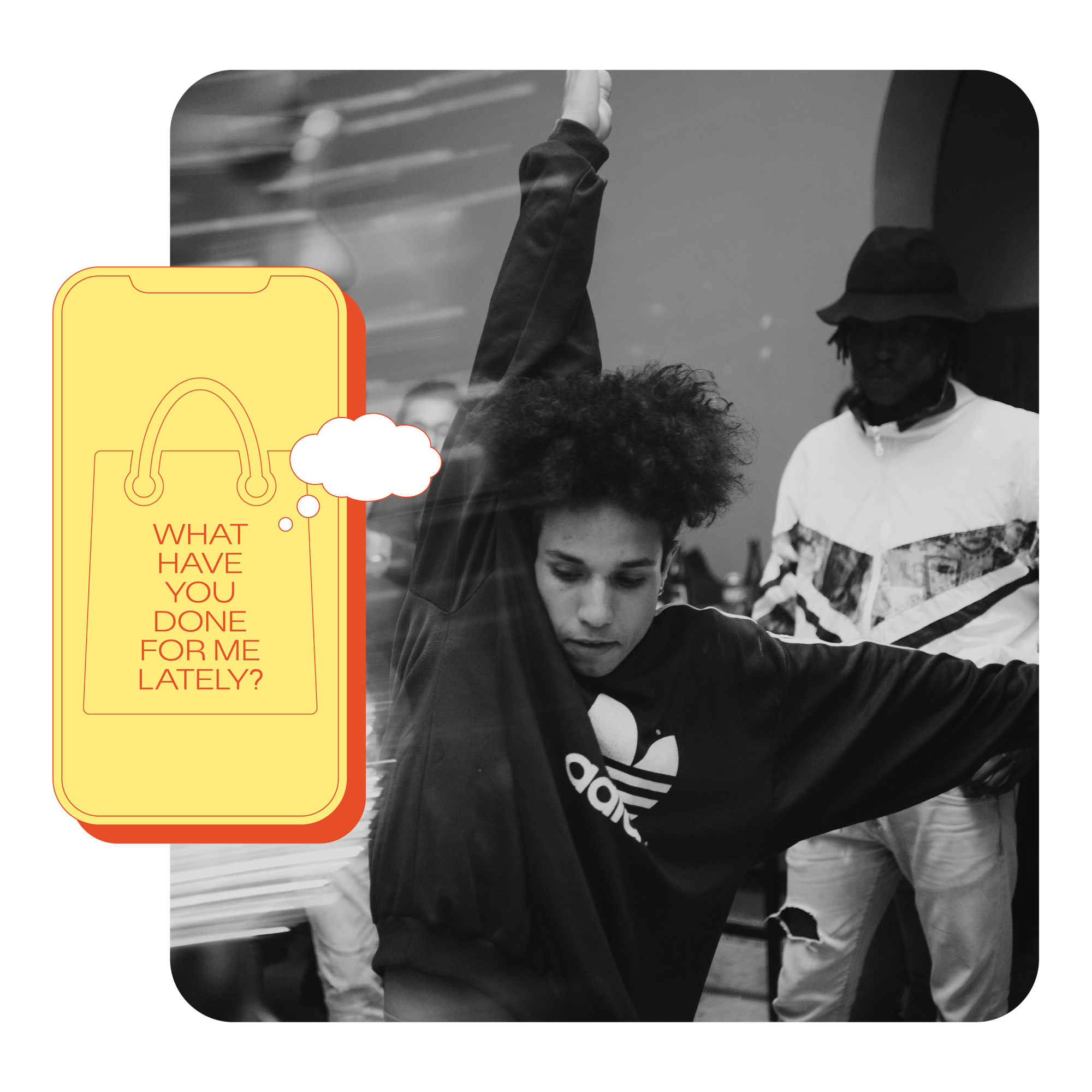
That said, when we asked Zs to define their relationships with individual brands, we found that they’re more monogamous than the stats alone let on. Megan, 21, for instance, says that she’s “not super into brand loyalty” but does buy from Lululemon “all the time.” Meanwhile, Jack, 25, says he’s “guilty of brand loyalty” when it comes to Nike — and Nike only. “I’m a ‘Just Do It’ kind of guy,” he says. Then there’s Bailey, 18, who says that he’s “loyal to a specific style,” and therefore sticks with certain brands because they evolve as he does.
The reality is that Zs are evolving the very definition of brand loyalty. This generation is loyal-ish; they’re playing the competitive “brand field” for now, while keeping their eyes out for brands worthy of their long-term love.
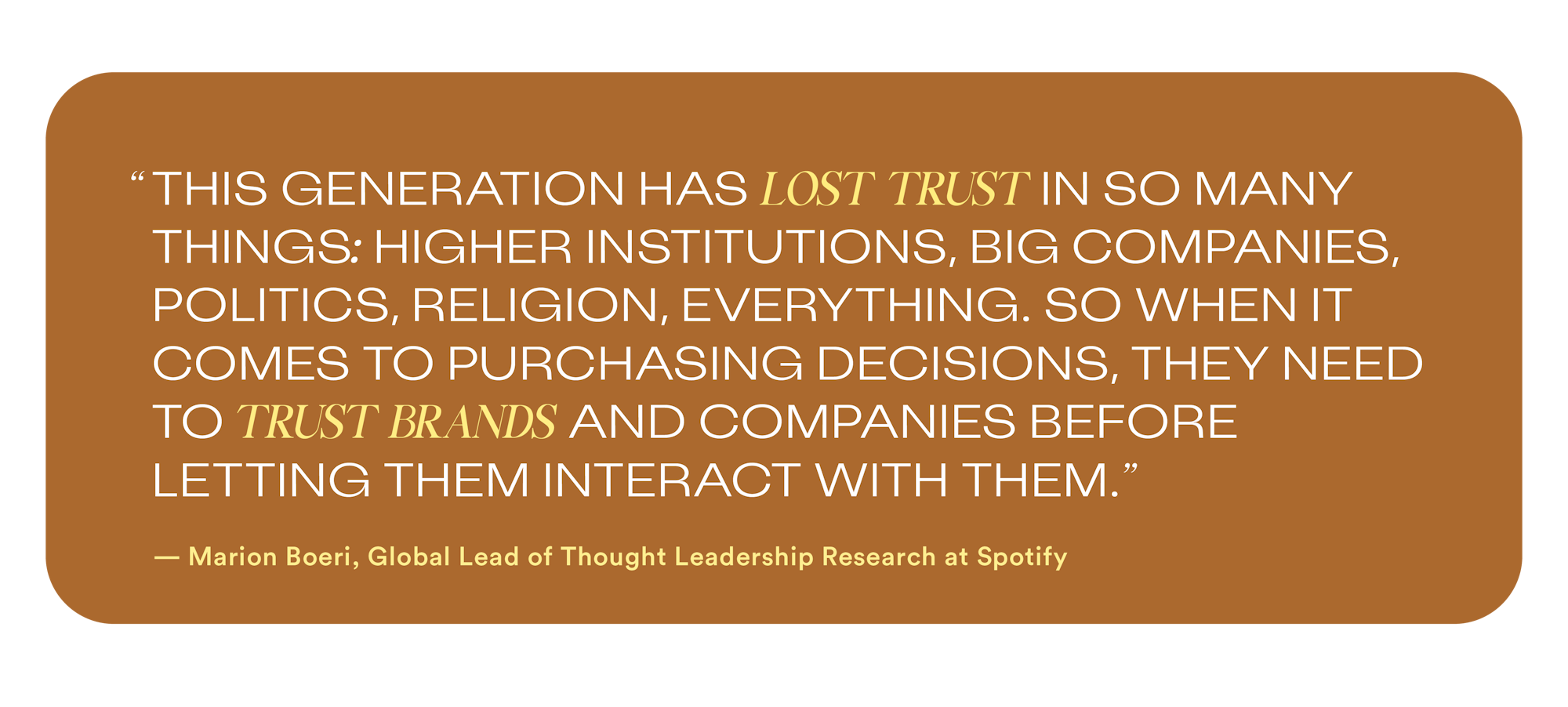
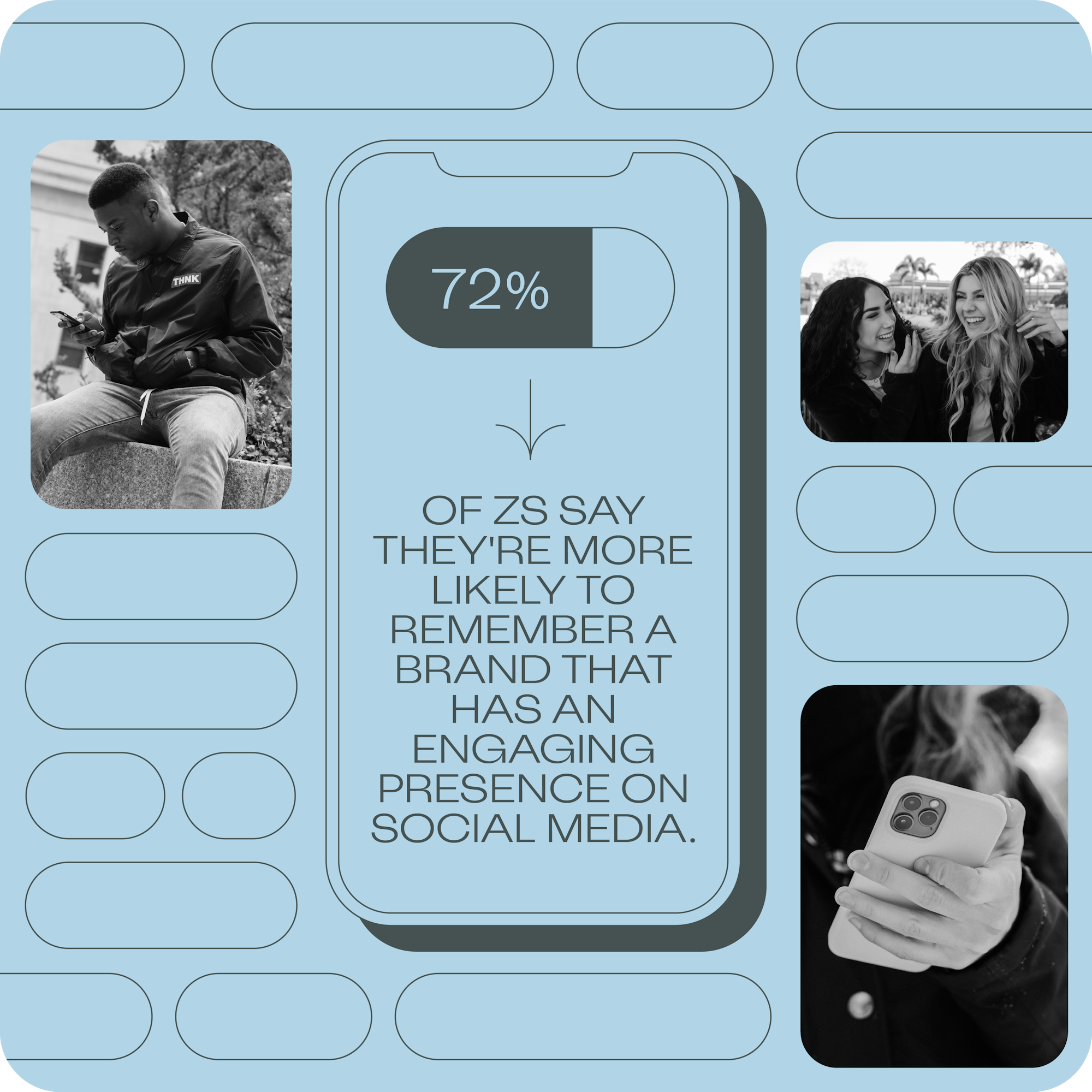
TAKING IT TO THE NEXT LEVEL
So how do brands get Gen Zs to drop the ‑ish and go full loyal? The key is understanding what Zs want from their relationship with brands. If the old model of brand loyalty centered around how the consumer served the brand through repeat purchases, Zs seek brand relationships that feel far more reciprocal. While the loyalty programs, discounts, and early access to products that brands have always offered customers are still important to this gen, they expect brands to offer them benefits… even if they’re not customers (yet).
In fact, loyalty to a brand isn’t defined by purchase, according to Zs. To this generation, the more intimate and personal aspects of a brand go further toward relationship-building than do transactions. Zs are much more likely than their Millennial counterparts to say that showing brand loyalty means simply telling your friends about a brand (54% vs. 41%). And when asked about the most important ways to show loyalty, Zs said simply loving the brand even if they don’t purchase it (40%) and following the brand on social media (29%) are enough.
In fact, having an entertaining and engaging presence on social media is a key way for brands to earn Zs’ hearts. While this obviously isn’t new information, brands need to get out of the transactional mindset that makes Gen Z’s feeds just another space to reach them with ads. Instead, brands should use social media to add value to Zs’ lives. Think of it as that little daily dose of communication that lets your crush know you’re into them — and makes them want to take it to the next level too. In fact, 72% of Zs say they’re more likely to remember a brand that has an engaging presence on social media (and beyond) than one that just serves them ads. And nearly half of Zs say they prefer funny or entertaining content from brands over information about their products.
Kaj, 20, and Elisa, 16, both called out Duolingo’s notoriously “unhinged” TikTok presence as an example of a brand that’s getting it right — and is tempting them to commit. “If Duolingo didn’t use TikTok like they do, I probably would never use them,” says Kaj. “But since they do such a good job, I’m like, ‘Okay, maybe I can do this in my free time.’” Meanwhile, Scrub Daddy’s TikTok has earned 20-year-old Emma’s loyalty: “Every time I go to the grocery store and I see Scrub Daddy, I think about their TikTok. So it’s working.” At the same time, 39% of Zs feel that having no social media presence makes a brand less cool — a clear indicator that brands playing coy will be left on read.
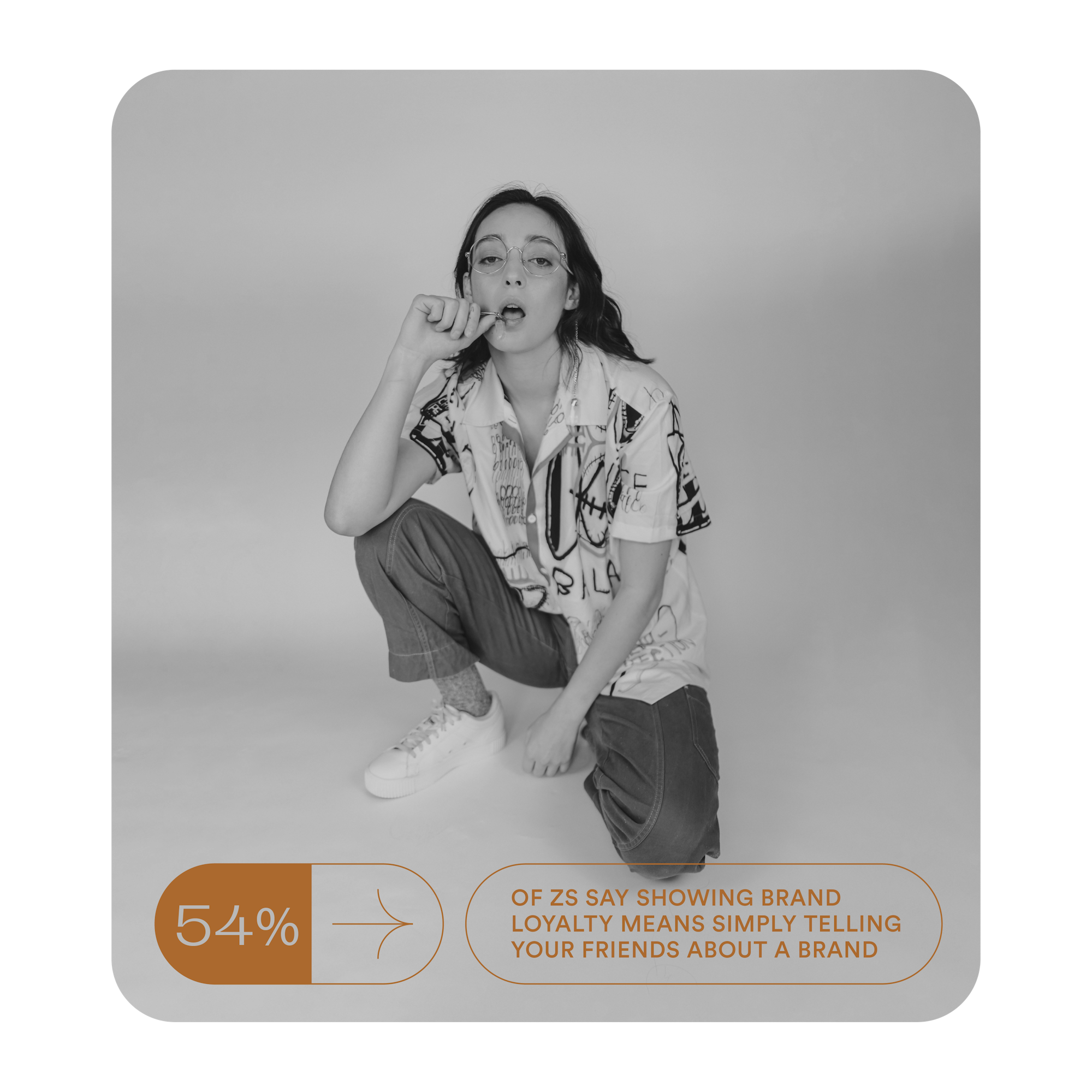

BRAND MONOGAMY
While the previous consumer journey saw the point of purchase as a brand’s “happily ever after,” for Zs, a brand that isn’t still wooing them post-purchase may as well have ghosted them. To earn Zs’ elusive loyalty, brands need to keep this gen engaged for the long haul — and that means creating a whole universe of touchpoints for them to traverse and explore. As Lucy Maguire, senior trends editor at Vogue Business, put it: “Brands that are successful in building loyalty know that the post-purchase journey is not actually just about the product. The secret sauce today is creating a universe and making Zs feel a part of a community.”
Indeed, when we asked Zs about a range of options that could make a brand “more cool,” products barely rose to the top. Instead the top efforts Zs said elevated a brand’s cool factor in their eyes was exclusive content (55%), sponsored events (55%), and collaborations with artists, celebs, or other brands (52%). Meanwhile, 54% of Zs say that their favorite brands are the ones that make them feel like they’re part of a community. Some of Gen Z’s favorite brands are doing just that, going beyond products to create true two-way relationships. Dior, for instance, now creates podcasts, YouTube series, and documentaries that lift the veil on their most iconic products and figures, while fashion brands from KENZO to Adidas chat up their Gen Z fans in Discord channels. Brands such as Glossier are even opening concept stores more focused on building community than driving sales. Meanwhile, Maguire says she’s seeing “cool Gen Z‑founded streetwear labels” host pop-ups “where there’s a DJ and a drink sponsor, and Zs go to meet like-minded people.” In other words, “cool” brands are the ones engaging Zs with far more than product. And with 84% of Zs saying they’re more likely to purchase from brands that they see as “cool” compared to ones they don’t, this universe-building is key to winning their loyalty.
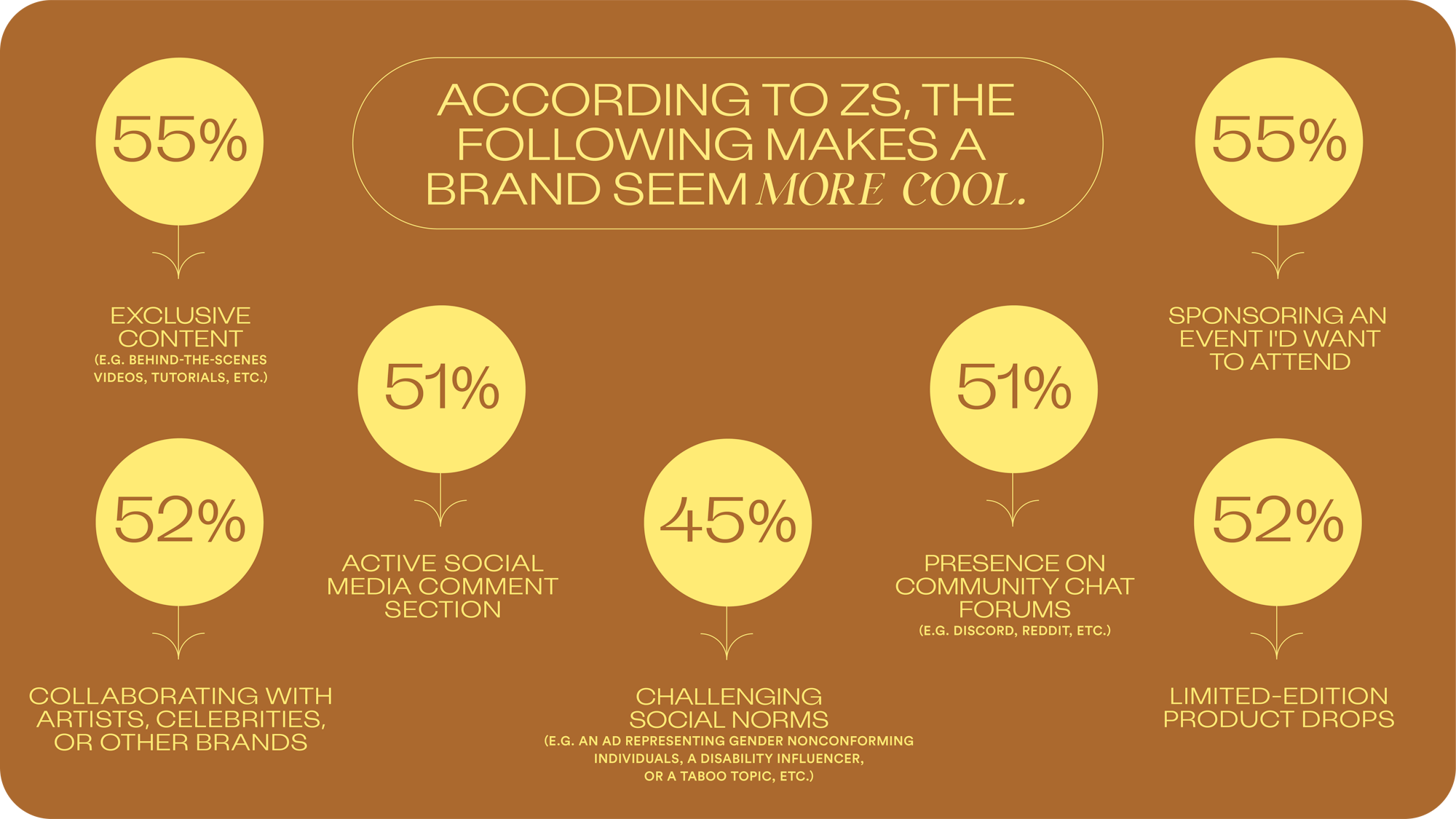

SURVIVING THE 7-MONTH ITCH
Brand universes — including content, events, and collabs — are also a great way for brands to keep the consumer relationship fresh. In the same way that monogamous relationships lose their luster — hitting a rough patch seven years in — the fast-paced world Zs live in means that this itch may creep in a lot sooner, especially when it comes to brands. While it’s unrealistic to pivot one’s product every time the 7‑month (or even 7‑day) itch strikes, brands with content universes have more power to remix touchpoints to keep the brand-consumer relationship spicy. In fact, 41% of Zs say the most important attribute when it comes to loyalty is “Creativity: They’re always exploring new ideas.”
Finally, just like any long-term commitment, there’s one thing that must be the foundation: trust. When asked which attributes impact their loyalty to brands, products, and creators, Gen Z’s top answer is “Trust: I believe what they say” (51%). And while that means being consistent with delivery, quality, and performance promises, Zs want to know what brands stand for and how they operate. One of the benefits of the brand universe is to let Zs “lift the lid” on a brand and see if it’s one they can feel proud to support. As Stephen Canfield, director of brand marketing at Airbnb, told us, “Trust is not built in a day; it’s built through a relationship. And a relationship is the fundamental opposite of a funnel.”
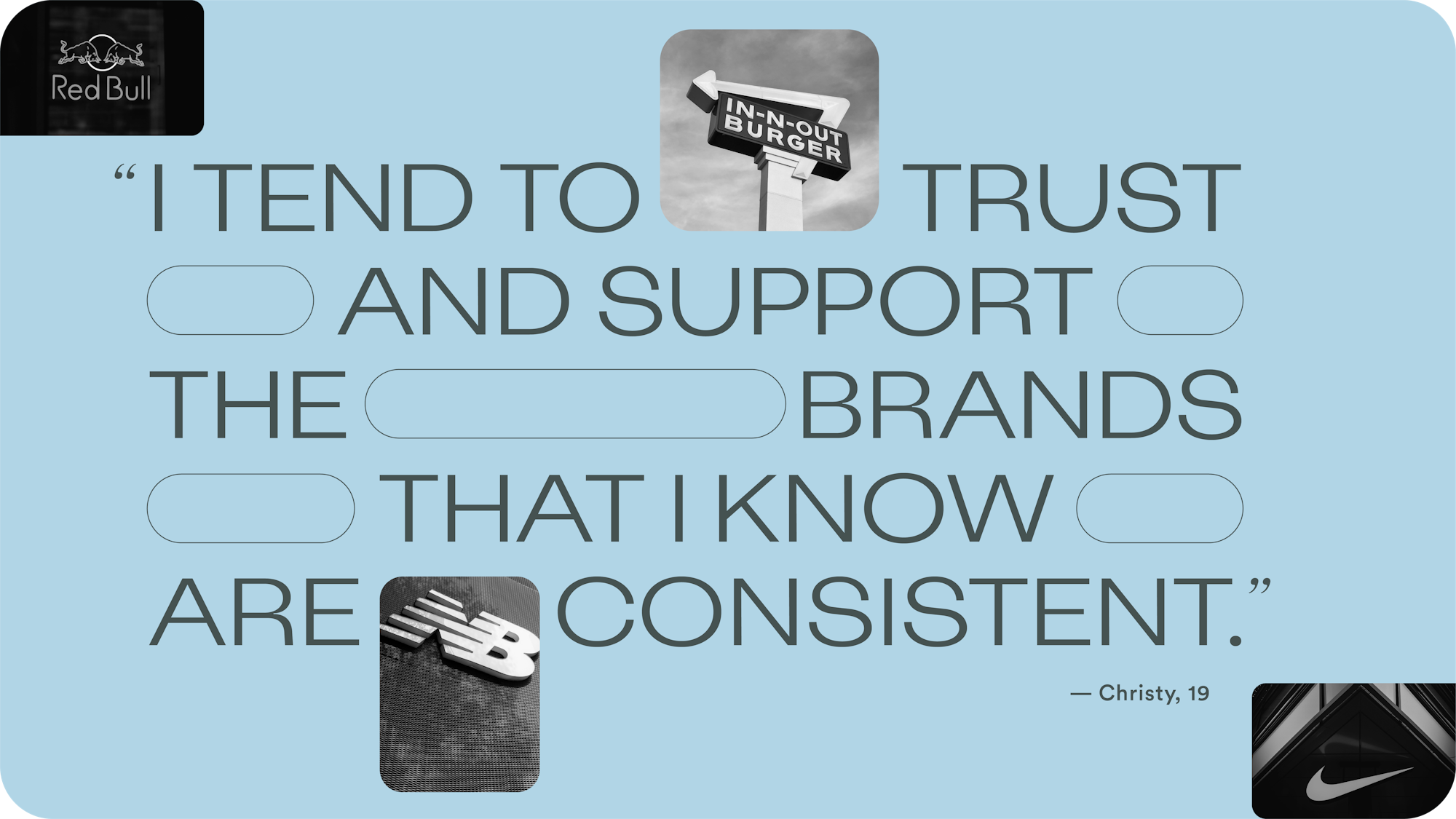
WHAT IT MEANS TO BRANDS:
Embrace the “situationship.” Zs may be playing the field, but that doesn’t mean you can’t have a meaningful relationship with them. Provide real value now, with the long view of how to keep them coming back for more.
Reimagine loyalty around them, not you. Zs expect to experience brand benefits before they consider being loyal. Go beyond traditional product-centered rewards, such as discounts, and offer ways for them to leverage their relationship. Think: a gifting program for early adopters or data-driven opportunities for self-expression.
Invite Zs to be a part of your universe. Zs don’t see their relationship with brands as simply transactional; they want to step into your world. Chat with them on Discord, peel back the curtain through behind-the-scenes tours and tutorials, and invite them to hack your brand at IRL events.


